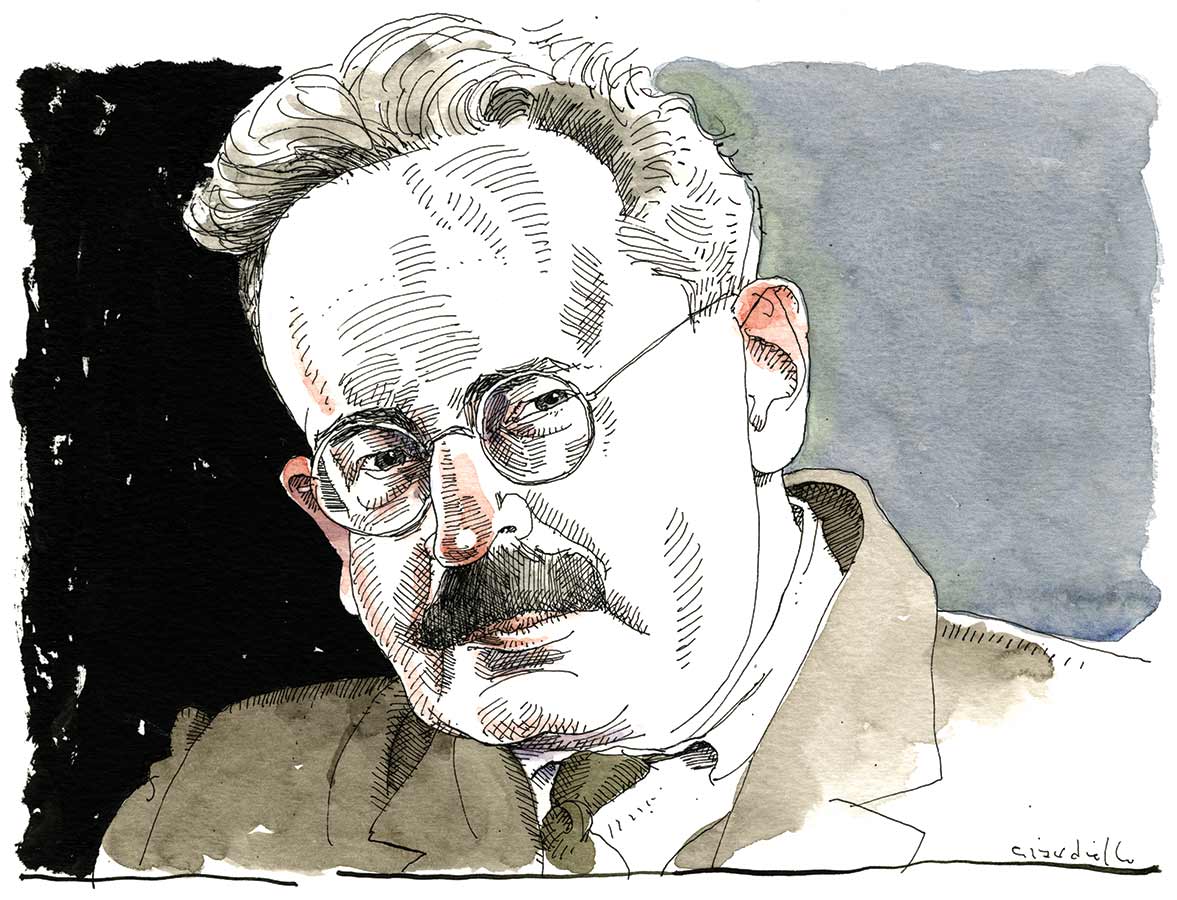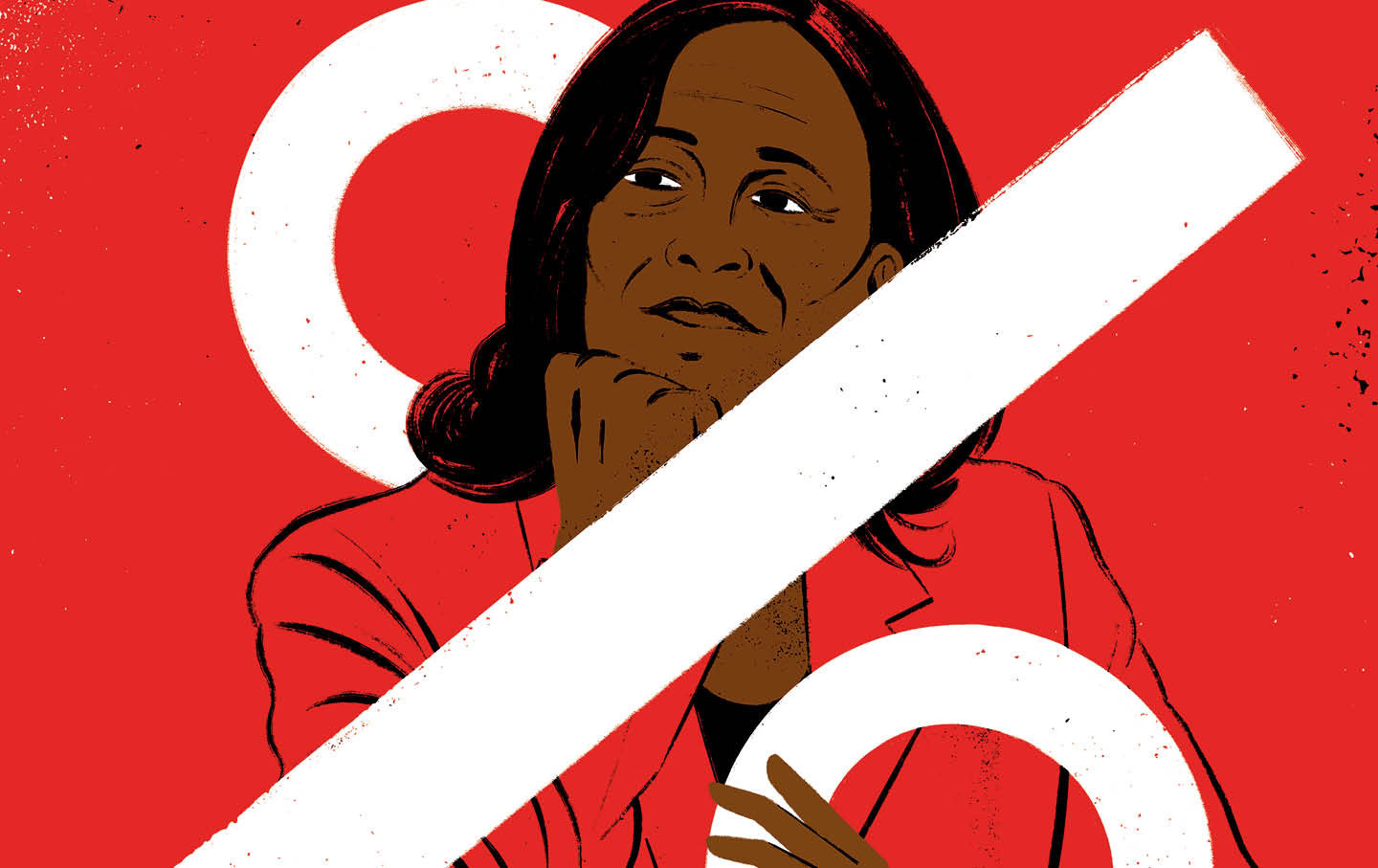President of the Moon Committee
Walter Benjamin’s radio years.
Walter Benjamin’s Radio Years
After the faculty of philosophy in Frankfurt rejected his dissertation and dashed his hopes for an academic career, the Marxist critic found work as a radio broadcaster.

No audio recordings of Walter Benjamin have survived. His voice was once described as beautiful, even melodious—just the sort of voice that would have been suitable for the new medium of radio broadcasting that spread across Germany in the 1920s. If one could pay the fee for a wireless receiver, Benjamin could be heard in the late afternoons or early evenings, often during what was called “Youth Hour.” His topics ranged widely, from a brass works outside Berlin to a fish market in Naples. In one broadcast, he lavished his attention on an antiquarian bookstore with aisles like labyrinths, whose walls were adorned with drawings of enchanted forests and castles. For others, he related “True Dog Stories” or perplexed his young listeners with brain teasers and riddles. He also wrote, and even acted in, a variety of radio plays that satirized the history of German literature or plunged into surrealist fantasy. One such play introduced a lunar creature named Labu who bore the august title “President of the Moon Committee for Earth Research.”
Books in review
Radio Benjamin
Buy this bookToday Benjamin is widely esteemed as one of the foremost cultural critics and theorists of the 20th century. But his career was uneven and marked by failure. In 1925, after the faculty of philosophy in Frankfurt rejected his enigmatic study of German Baroque drama and dashed his hopes for an academic career, he found himself adrift, with little assurance of a regular income. But this failure also brought freedom. His untethering from the university meant that he could indulge in his interests without restraint, and he turned his talents to writing essays that took in the whole panorama of modern life—from high literature to children’s books and from photography to film—and, for nearly six years, he supplemented his earnings with radio broadcasts, some for adults and others meant especially for children. Of the many broadcasts, about 90 in all, that he produced for the radio stations in Frankfurt and Berlin, only a fragment of a single audio recording has been preserved; unfortunately, Benjamin’s voice cannot be heard.
Now transcripts of these broadcasts have been assembled and translated into English in a new volume edited by Lecia Rosenthal, whose incisive introduction assists the reader in appreciating their true significance. One can’t help but wonder what Benjamin would have made of all this attention, since he was inclined to dismiss his radio work as unimportant. In correspondence with his friend Gershom Scholem, he wrote with some embarrassment of “piddling radio matters” and condemned nearly all of it as having “no interest except in economic terms.” Today we know that he was mistaken. The transcripts are more than mere ephemera; they are perfect specimens of Benjamin’s interpretative method, exercises in a style of urban semiotics that he would later apply during his exile in Paris. Hannah Arendt once likened her late friend to a pearl diver who possessed a gift for diving into the wreckage of bourgeois civilization and emerging into the sunlight with the rarest of treasures. The radio transcripts offer further evidence of a genius whose career was ended far too soon.
The transcripts have the virtue of brevity, making them welcome introductions to Benjamin’s ideas for those who may find his major tomes—such as Origin of German Tragic Drama or The Arcades Project—ponderous or forbidding. Although in subject matter they travel a vast terrain, they also have the intimacy of a personal essay spoken right into your ear. A written transcript, after all, is also technically a recording, even if it is a soundless one. When we read these transcripts carefully, we can still hear what scholars of literature like to call “the authorial voice.” But even those who don’t especially care about Benjamin will find his radio tales fascinating as specimens in the history of technological communication, a history that spans the modern era from the early days of wireless journalism to the digital podcasting of our own day. Step into a time machine and travel back a century: You’d hear the voice of Walter Benjamin instead of Ira Glass.
The very first radio transmission ever heard in Germany was broadcast at 8 pm on October 29, 1923. It lasted only a single hour, after which the station went silent. The Berlin Funk-Stunde or “Radio Hour” soon extended its programming to nearly eight hours each day; its programs consisted chiefly of music supplemented with the occasional lecture, literary reading, or play. By 1930, regional broadcasting companies had stretched their electromagnetic waves to cover nearly 70 percent of potential German audiences, but those who could actually afford to tune in were still overwhelmingly urban; the farmlands and forests remained mostly silent.
In its initial years, the radio was a luxury reserved exclusively for the urban middle class. To listen to the wireless, a household had to buy a receiver, and then pay the post office for a “license” to operate it; there was also a monthly fee. In the popular imagination, we tend to picture a family nestled in comfort before a single speaker as if around the family hearth. But the earliest radios were not elegant pieces of furniture for shared experience; they were exotic contraptions with exposed mechanics and personal headphones that isolated each listener within a private auditory space. Only in the late 1920s did the household radio assume a more domestic form, with a single loudspeaker that projected the transmissions into a shared room. This was when Benjamin made his debut.
Imagine “Dr. Walter Benjamin” (as he was listed in the Frankfurt Radio bulletin), whose disembodied voice floated through the airwaves into German homes for the very first time on March 23, 1927. He lectured on young Russian writers, an edifying topic about which he could claim some familiarity thanks to his recent travels in the Soviet Union, where he had weathered two months of a bleak Moscow winter while pursuing a hopeless romance with Asja Lacis, a Latvian-born communist who was active in the children’s proletarian theater. Though the full transcript of this early lecture is missing, it’s only one sample of the many reports on Soviet culture that Benjamin published that same year, all of them reflecting his grim recognition that the USSR was hardly the workers’ and artists’ paradise of leftist imagination.
Following this first leap into radio commentary, Benjamin continued to build his career in Germany as both a freelance writer and a critic on the air, and for several years he managed to scratch out a more-than-tolerable existence, all the while hoping for grander things. His ultimate goal, as he confessed to a friend in 1930, was to become “the foremost critic of German literature.” But this ambition would go unfulfilled, and his bold forays into the high canon, such as an early essay on Goethe’s novel Elective Affinities, were masterful but rare. More typical were his exercises in short-form criticism, including the stories he wrote expressly for the radio. Among the most entertaining are reports in which the everyday becomes exotic or the modern is interlaced with nostalgia. In a broadcast from late 1929 or early 1930, he describes the market halls in Berlin that he had first visited as a child, where the smells of fish, cheese, flowers, raw meat, and fruit intermingle under one roof, creating a “dim and woozy aroma” that complements “the light seeping through the murky panes of lead-framed glass.” Nor can he leave out the smallest detail: “And let’s not forget the stone floor, which is always awash with run-off or dishwater and feels like the cold and slippery bottom of the ocean.”
This description closely anticipates his project on the Parisian arcades, those iron-and-glass passages lined with shops that would become the focus of his fascination in the 1930s. But the radio addresses come almost entirely from a time before Benjamin’s emigration to France, and in many of them one can hear the enthusiasm of the Berlin native who loves nothing more than to share stories of the city he knows best. Nor can he resist a winking nod to his listeners: “If I really want a special treat, I go for a walk in the Lindenstraße market hall in the afternoons between four and five. Maybe someday I’ll meet one of you there. But we won’t recognize each other. That’s the downside of radio.”
Was this really a disadvantage? One might argue that radio was Benjamin’s ideal medium, because he loved to hide. Though some readers have claimed his legacy for the tradition of Marxism, he was never a firebrand, and he found his greatest happiness not in public controversy but while burrowed away privately with his books. In a 1930 broadcast called “Demonic Berlin,” he tells his auditors that as a child his parents forbade him from reading the stories of the 19th-century German author E.T.A. Hoffmann, because his tales were populated with ghosts and doppelgängers and “monstrous figures of every kind.” Hoffmann was a master of the uncanny, about whom his contemporary, the poet Heinrich Heine (a distant relation of Benjamin’s), once observed that “even the devil could not write such devilish stuff.” So of course Benjamin read Hoffmann’s tales all the more passionately, in secret, seated alone in the family’s dining room, where (Benjamin tells us) “all the terrors, such as fish with stubby snouts, gradually gathered in the darkness at the edge of the table.”
The printed page was Benjamin’s place of safety, where he could hide himself as he had in childhood. But he also transformed the cityscape itself into a refuge: the artifice of urban space turned into an interior, the outside into inside. He treated cities, chiefly Berlin and Paris, as objects of reading. For these exercises, Hoffmann was an early inspiration. Benjamin tells his listeners that Hoffmann saw the city of Berlin with the eyes of a physiognomist, revealing that “this prosaic, sober, enlightened, and rational Berlin is full of things to charm a storyteller—not only in its medieval nooks, secluded streets, and somber houses, but also in its working inhabitants of every social rank.”
This was not only a portrait of Hoffmann; Benjamin was also describing his own method. This would become his special skill as a writer: He offered physiognomies of modern life and transformed everything he saw into a dreamscape that spilled over with both promise and danger. He devoted one broadcast to the Lisbon earthquake of 1755, whose tremors were felt from the coasts of Morocco to France. Eighteenth-century Lisbon, a thriving hub of Portugal’s global empire, had well over 250,000 inhabitants, of whom nearly a quarter perished. It was said that the cathedral towers in faraway Seville shook “like reeds in the wind.” Benjamin was only one in a long line of critics to write about the earthquake; European philosophers from Voltaire to Kant had pondered its meaning. But Benjamin possessed a skill in description that surpassed nearly all of his predecessors, and in the brief 20 minutes of his broadcast, he conveyed the terror of the event with inimitable precision. He ascribed special importance to the earthquake as a sign that the earth’s crust is never at rest, that the ground beneath us is in “perpetual upheaval,” and that nature is no less violent than the history of humanity.
That theme recurs in one of his final broadcasts from the spring of 1932, a report on the Mississippi flood of 1927 that claimed hundreds of lives in several states, and according to Benjamin plunged 100,000 square miles of farmland underwater from Missouri to Kentucky to Tennessee. An estimated half-million inhabitants lost their homes, and Benjamin provides the auditor with a desperate portrait of three brothers who tried to save their livestock but were forced to climb to the peak of their roof while the rising waters raged below. Only one of the brothers would survive, and Benjamin quotes a long passage from the man’s harrowing experience. With his characteristic habit of interpretation, Benjamin turns the disaster into an allegory for politics. Just before he says goodbye to his listeners, he promises that he is not done with the Mississippi: “On some other occasion we’ll return to its banks during times when the river flowed peacefully in its bed, but there was little peace to be found on its shores.” Once again, he says, “we’ll find ourselves on the banks of the Mississippi, but this time facing the raging elements of human cruelty,” by which he means the Ku Klux Klan. “The dams that the law has built to contain them have held up no better than the actual ones made from earth and stone.”
In these words, one can hear the growing desperation of an intellectual who recognizes that the civilization that surrounds him is menaced by a rising tide of hatred, be it fascism in Europe or the Klan in the United States. Like a man climbing to his roof, Benjamin reports on the flood that threatens to engulf him and he hopes for rescue. But the waters continue to rise; by early 1933, the Nazis would seize power in Germany and bring his career on the radio to an end. His last commissioned work for Radio Berlin was a fantastical play he had composed himself. The transcript, titled “Lichtenberg: A Cross-Section,” ranks among the strangest things that he ever wrote. Beings who live on the moon are charged with the task of investigating the career of Georg Christoph Lichtenberg, a prominent physicist of the German Enlightenment. The moon beings have uncanny names—Labu, Quikko, Sofanti, and Peka—and they convene as the Moon Committee for Earth Research, which deploys odd contraptions for its work, each of them “easier to use than a coffee grinder.” There is a “Spectrophone,” which permits them to hear and see everything that happens on Earth; a “Parlamonium” that translates human speech into music; and an “Oneiroscope” that allows the researchers to observe human dreams. With the aid of these devices, the moon beings seek to understand why humans are so afflicted with misery. Their investigations finally reach the tentative conclusion that even if humans are unhappy, “perhaps it is their unhappiness that allows them to advance.” To honor the scientific achievements of Herr Lichtenberg, they conclude by naming a crater in his honor, a crater from which shines a “magical light that illumines the millennium.”
Unlike the other broadcasts transcribed in this book, the Lichtenberg play was never heard on the air. Benjamin’s final radio appearance came on January 29, 1933, when he read early selections from what would later appear as his most affecting book, Berlin Childhood Around 1900. The very next day, Adolf Hitler was appointed chancellor of Germany, and Lecia Rosenthal records the bitter fact that, to celebrate their victory, the Nazis held a torchlight parade that was broadcast across all of Germany—the first live transmission by radio that was truly nationwide.
As the Third Reich brought all forms of communication under state control, the radio became yet another medium of Nazi propaganda on which the German people could hear the voice of the Führer. The irony, of course, is that it was the massive expansion of wireless broadcasting in the 1920s that assisted the Nazis in tightening their grip on popular consciousness. The same was true in the United States, where the wireless technologies introduced in the ’20s became the preferred medium in the ’30s for hatemongers and conspiracy theorists like Martin Luther Thomas and Father Coughlin. No doubt all forms of mass media have this double edge: They can enhance democracy but also destroy it. The same technologies that are used for public benefit in broadcasts such as WNYC’s On the Media with Brooke Gladstone or Democracy Now with Amy Goodman are also used for disinformation and hatred by the likes of Rush Limbaugh and Alex Jones. This irony is probably built into radio, as it is with all forms of mass media. To imagine a medium of communication that would be immune to such pathologies is like trying to imagine a language without curses. But that would be a language reserved for the angels alone.
Today audio communication continues its swift metamorphosis, from the first wireless broadcasts of a century ago to the podcasts that are accessible not on the radio but via cellular technology or the Web. These innovations have also restored something akin to the original experience of individualized listening: Earbuds have replaced the cumbersome headphones that were shackled to the first wireless boxes, but they have also reintroduced the experience of auditory isolation from one’s spatial surroundings. One can’t help but wonder what this new technology is doing to our sense of shared public space, which is now fractured into millions of separate soundscapes even while everyone may be physically navigating the same street. Can we feel the same responsibility for the places we inhabit when we no longer hear the same things? The risk is not only that the pedestrian misses the roar of the car that is turning into the crosswalk. How often does one hear the panhandler who is asking for change, or the busker who is singing in the subway? The danger is that we may begin to lose the sense of belonging to the same world at all.
Back when Benjamin delivered his broadcasts by radio, he was preoccupied with the question of how we experience urban space, but he believed that we all could experience that space in common, and he even nourished a kind of utopian idea that modern technology could bring collective action—or possibly revolution. But the new technologies have defeated this dream. They often make us not more united but more isolated from one another, while at the same time the sheer number of broadcasting signals has multiplied to the point where it’s entirely conceivable that on a crowded city street, no two people are listening simultaneously to the same podcast or song. Thanks to the digital revolution, the old monopolies of corporate media have given way to a new situation where just about anyone can start up a podcast and share their opinions about whatever they wish—whether their opinions are helpful or not, and whether the statements are true or false. This diversity has the great advantage of democratizing the medium of communication. But with this advantage also comes a host of disadvantages—more ranting, more conspiracy theories, more hate. The more populist the technology, the more eloquence is mistaken for elitism. And this is a problem not only for politics but also for aesthetics; after all, not every aspiring podcaster has Benjamin’s gift for language. Many podcasts today are unscripted, free-for-all chats with little form and little content. Benjamin understood these risks, but he still held fast to the hope that the radio could introduce what he called “a total transformation and rearrangement of the material.” Today that optimism may be hard to sustain, but open a new podcast and you might discover a pearl.
The best of them still bear some resemblance to Benjamin’s broadcasts from a century ago. When I lived in Paris in the 1990s, I listened in the evenings to Domaine Privé, a radio show that was hosted weekly by a different personality, artist, or intellectual who selected a favorite musical example and then offered reflections on its meaning. (I still recall Julia Kristeva on The Magic Flute.) More recent examples include the Ideas series, hosted by Nahlah Ayed on the CBC Radio One, or In Our Time, hosted by Melvyn Bragg on BBC Radio Four, or Le Pourquoi du comment, a daily radio show on France Culture that lasts all of six minutes each morning, in which the philosopher Frédéric Worms offers brief, gemlike commentaries on philosophical themes. Along with well-known Anglophone programs such as This American Life and Radiolab, these broadcasts all share Benjamin’s spirit of curiosity and his talent for conveying through the spoken word the sheer abundance of things that can fascinate and inform, turning us all back into children, listening with rapt attention to the voices on the air.








